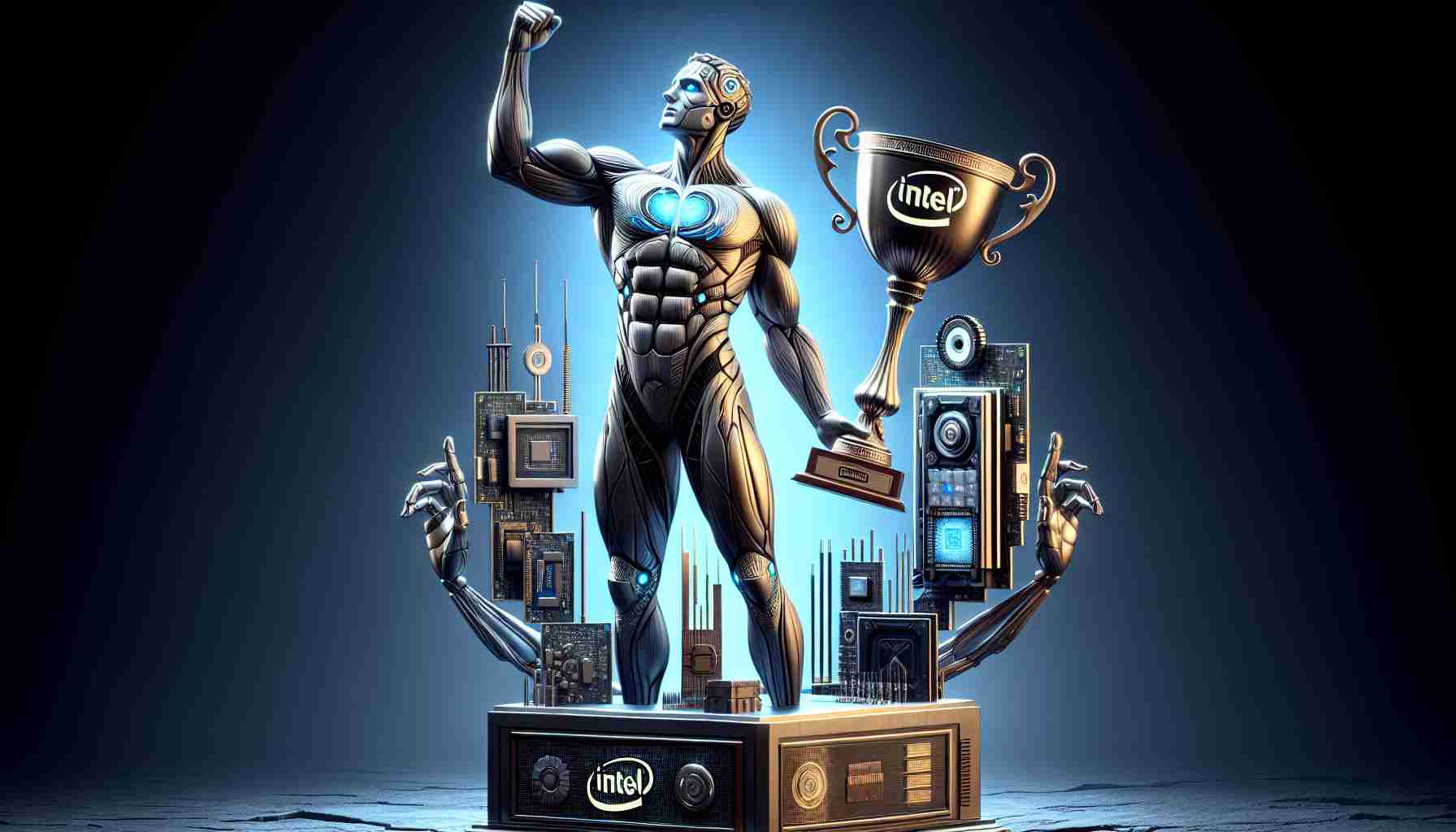Sparking Curiosity in the Semiconductor Industry
The investment landscape has been electrified by Citadel Advisors’ bold strategy of amplifying its holdings in the semiconductor sector—a move that highlights the dynamic nature of tech stocks and hints at a possible resurgence for industry titan, Intel.
In a recent demonstration of confidence, Citadel Advisors, guided by the acumen of billionaire Ken Griffin, augmented its stake in Intel with the acquisition of an impressive 11.7 million shares. This increase of 172% arrives amidst a tumultuous year wherein Intel witnessed over a 50% nosedive in share prices. The situation has left investors questioning the reasoning behind such a significant leap and what future prospects lie on the horizon for Intel.
The Potential Rebirth Driven by Patriotic Technology Policies
One pivotal factor that could pivot Intel’s fortunes is the U.S. government’s strategic push to enhance domestic semiconductor manufacturing. The CHIPS Act represents such an initiative, designed to strengthen America’s semiconductor production capabilities. This legislation might be a catalyst for Intel’s hopeful revival, offering much-needed leverage against international competition and operational difficulties.
Striking a Balance Between Optimism and Caution
While excitement brews over Griffin’s daring maneuver, analysts urge caution, pointing to the myriad challenges Intel still faces, including fierce competition and significant internal restructuring. Although Citadel’s actions could herald a positive shift, everyday investors are advised to remain prudent and thoroughly examine the broader market scenarios before committing.
In this dance of possibilities and uncertainties, the potential resurgence of Intel reflects a broader narrative in the ever-evolving tech industry—one where innovation, government policy, and strategic foresight converge.
The Symbiotic Evolution of Tech Stocks and Sustainability: Intel and the Future of Semiconductors
The semiconductor industry, pivotal in the advancing technological landscape, is also emerging as a battleground for sustainability and economic resilience. Citadel Advisors’ profound investment in semiconductor giant Intel serves as a dynamic example of modern finance bolstering, and potentially reshaping, this critical industry. Through a lens of environmental consciousness and economic foresight, we can trace the ripples of such investments across the globe, touching ecosystems, economies, and the future trajectory of humanity.
The Environmental Impact of Semiconductor Manufacturing
Semiconductors are vital to a myriad of devices, from smartphones to solar panels, but their production is resource-intensive and not without significant environmental repercussions. This sector heavily relies on rare earth minerals, and its manufacturing processes produce large volumes of emissions and waste. The CHIPS Act, with its push for domestic manufacturing, emphasizes cleaner and more sustainable production methods. By investing in these domestic capabilities, companies like Intel can spearhead innovations in eco-friendly practices, potentially reducing the industry’s overall carbon footprint and water usage.
Economic Influence and Tech Sovereignty
As Citadel Advisors’ audacious acquisition indicates, semiconductor companies are at the core of modern economic frameworks. The amplified investment in Intel, coupled with U.S. governmental initiatives like the CHIPS Act, hints at a move towards reducing dependence on foreign semiconductor manufacturing, primarily in Asia. This dual strategy of investment and policy could stabilize the global supply chain, protect against geopolitical tensions, and ensure economic sovereignty through self-reliant technology infrastructure.
Connecting to Humanity’s Technological Futurity
Technology’s future, interwoven with innovation in semiconductors, promises not just economic revitalization but also a pathway towards sustainable living. Semiconductors are foundational to advancements in artificial intelligence, the Internet of Things (IoT), and renewable energies—all crucial for addressing climate change and enhancing global quality of life. By strategically investing in semiconductor companies and prioritizing domestic growth, humanity can unlock potential societal benefits, leading to smarter cities, efficient energy solutions, and breakthroughs in healthcare technologies.
Toward a Balanced Future
While Citadel Advisors’ gamble illustrates an optimistic forecast for Intel and the semiconductor industry, it is imperative to strike a balance between technological progress and environmental stewardship. A holistic approach ensuring sustainable manufacturing while driving innovation could position the sector as both an economic powerhouse and a guardian of ecological integrity.
In summary, the semiconductor industry sits at a crossroads of economic potential and environmental responsibility, with bold moves by firms like Citadel and policies like the CHIPS Act driving the narrative. As we look to the future, harmonizing technological growth with sustainable practices becomes not just an option, but a necessity for a thriving planet and resilient humanity.
Investment Surge in Semiconductors May Signal Intel’s Comeback
The semiconductor industry has become a focal point for investors looking to tap into transformative tech stocks, as shown by Citadel Advisors’ audacious move to significantly expand its holdings in semiconductor firms, particularly Intel. This pivot is stirring curiosity among market watchers and could denote a potential resurgence for Intel in the coming years.
The Reinvention of Intel Under Government Policy Support
A key factor likely to influence Intel’s recovery is the U.S. government’s strategic push toward bolstering domestic semiconductor manufacturing. The CHIPS Act is a cornerstone of these efforts, aiming to revitalize America’s semiconductor manufacturing prowess and offer Intel leverage against both international competition and ongoing operational hurdles. Such policy moves may serve as a vital springboard for Intel, potentially catalyzing growth and stabilizing its market position.
Weighing the Risks and Rewards
Investment groups, including Citadel Advisors, have placed considerable bets on Intel, with an astounding 172% increase in their holdings. This gamble comes during a volatile period where Intel’s stock has suffered a decline of over 50%. While such actions suggest confidence in Intel’s future, analysts advise caution, underscoring the challenges Intel faces. These include stiff competition from other semiconductor giants and the pressures of internal restructuring. Conservative investors are therefore encouraged to closely monitor these dynamics, assessing the risk and reward equation before making similar commitments.
Future Insights and Predictions
Looking forward, Intel’s trajectory may provide insights into broader industry trends, particularly as innovation continues to drive tech development. Policies supporting homegrown advancements in semiconductor technologies, such as the CHIPS Act, play a critical role in shaping the future landscape. Success for Intel could indicate a shift towards revitalized domestic tech capabilities, potentially setting a precedent for other companies in the sector.
Conclusion: A Cautiously Optimistic Outlook
While Citadel Advisors’ investment hints at optimism, Intel’s path to resurgence is lined with both opportunities and challenges. As the industry evolves, a confluence of policies, strategic maneuvers, and market trends will determine the outcomes for companies holding substantial stakes in semiconductor technologies.
For further information on the semiconductor industry and its market dynamics, consider visiting the official CITADEL website.




















